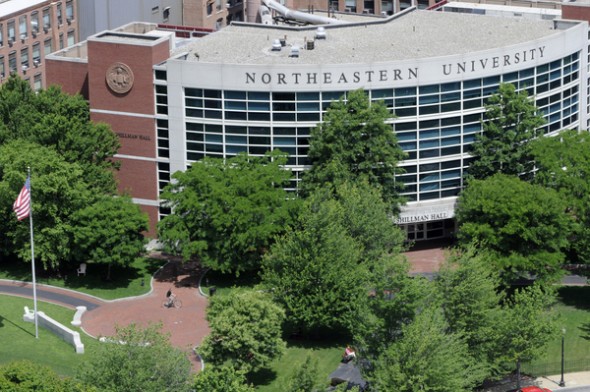By Leslie Hassanein, news staff
Days before the start of Black History Month, more than 100 students crowded into the John D. O’Bryant African-American Institute Jan. 26 for a student panel about the “Divine Nine”—nine historically Black Greek Letter Organizations (BGLOs). The fraternities and sororities hoped to recruit more Northeastern students into the Boston chapters of their organizations.
The organizations, consisting of five fraternities and four sororities, are all part of the National Pan-Hellenic Council (NPHC). The council was founded in 1930 at Howard University in Washington D.C. and prides itself on providing a space for the nine organizations to collaborate and live out their purposes.
“We needed to provide a sense of security for men on campus,” said William Belt, a student panelist from Boston University for the Alpha Phi Alpha Fraternity.
All nine BGLO chapters in the area are Boston-based and not specific to any university. At Northeastern, many African-American students join the Phi Beta Sigma fraternity, a member of the “Divine Nine” that preaches brotherhood, scholarship and service.
“I hadn’t been in a lot of situations that took me out of my comfort zone, so I decided to put myself into one,” said Derryck Adu, a senior communication studies major. “A lot of personal growth has come with it.”
Adu said members of Phi Beta Sigma show themselves as “men of the people” and that the fraternity strives to encourage greatness. Jaisun Lewinski, a senior political science major and member of Phi Beta Sigma, joined the fraternity in search of a global sense of brotherhood.
“I wanted to be surrounded by people pushing me to be great and who have the same ambitions I do,” Lewinski said. “That type of company helps you stay on your feet at all times.”
The “Divine Nine” have held historical and social importance, especially during periods of severe racial tension.
The early 1900s marked a series of race wars in the United States. At the time, the BGLOs served as study and support groups for minority students. The first of these, Alpha Phi Alpha, was founded at Cornell University on Dec. 4, 1906 by seven men, known as the “Jewels,” who recognized the need for unity among African descendants in the United States.
The Alpha Phi Alpha Fraternity has a reputation for being on the forefront of the civil rights movement.
W.E.B. Du Bois was incorporated as an honorary member of Alpha Phi Alpha in 1909, the same year he helped to start the NAACP.
Thurgood Marshall, the first black U.S. Supreme Court Justice, was among many Alpha Phi Alpha members to make strides in the movement for equality. He served as an attorney during the landmark Brown v. Board of Education of Topeka, Kansas court case. The 1954 decision declared state laws establishing segregated public schools to be unconstitutional.
Dr. Martin Luther King Jr., a Boston University alumnus, was a member of the Boston Sigma chapter of Alpha Phi Alpha. Fraternity brothers supported King during the Montgomery bus boycott and offered financial support for King’s campaigns.
Over the next 15 years, as racial tensions grew in the United States, seven more of the Divine Nine were founded, most at Howard University. Sigma Gamma Rho Sorority founded at Butler University in 1922, prides itself on being the only member of the NPHC that was founded at a predominantly white institution.
These BGLOs all have different mission statements, but they share a common goal: They all strive for the betterment of society as a whole. This sense of community advancement has continued into the present day, as well as a stress on individual growth.
Celeste Fields, a sophomore marketing major, joined Alpha Kappa Alpha Sorority after witnessing her mother’s love of the organization.
“I’ve always wanted to be a part of a sisterhood, but you can honestly get that in any sorority you join. [Alpha Kappa Alpha] just seemed like a better fit for me since I believe in their values and missions,” Fields said. “The organization works day in and day out ensuring they not only support young African-American females, but the black community as a whole through all their programs and service.”









